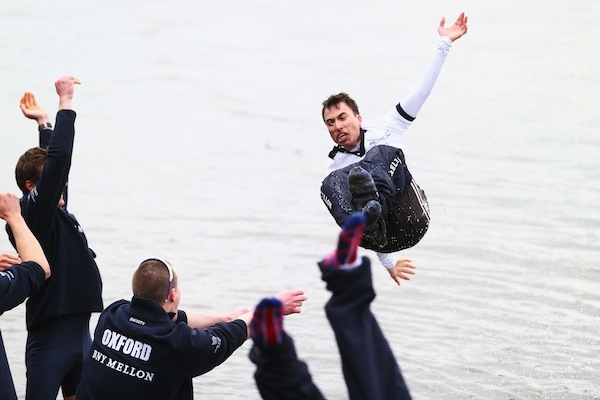Armando Iannucci’s The Thick of It listed an unusual character in the credits, a swearing consultant. And no wonder, for he must have been one of the busiest people on set. Lively on-screen swearing has been largely absent recently — until mid-afternoon on Easter Sunday, that is. Commentators Andrew Cotter and Dan Topolski were amiably rhubarbing away on the radio about this year’s Boat Race being a masterpiece of unbelievable tension (though anyone could see, even on the radio, that only a torpedo attack would prevent an Oxford victory) when Oxford’s diminutive cox, the Colombian Oskar Zorrilla, made his pitch for immortality.
A shrieked order, ‘Don’t fucking sit’, came crystal clear over the airwaves. Cotter and Topolski battled on as if nothing had happened. Then, with the same adjective, ‘Be tenacious’ and ‘That’s the stuff’. And finally, not surprisingly I guess, there was ‘Fuck yeah!’ as Zorrilla steered his boat over the winning line.
I had always thought the cox simply had to steer, and shout ‘in-out’ at the right time. Not a bit of it. An acquaintance at Cambridge was the Light Blues cox for three years. On an old tape of the race (they always record the cox’s advice), the closing exhortation featured the F word four times. A few years back, television picked up a cox saying, ‘It’s time to fucking attack them.’ My colleague Patrick Kidd observed at the time, ‘Viewers were shocked. Fancy someone with all that education using a split infinitive.’ The best-loved of all Boat Race eye-raisers came in the 1950s, I think, when John Snagge said: ‘Isn’t that nice, the wife of the Cambridge president is kissing the cox of the Oxford crew.’
For many people the Boat Race might register about as much as a selling plate on a rainy September night on the dirt at Wolverhampton. But more fool them: this was red in tooth and claw and blue in language and, in truth, captivating. Ignore those tired old criticisms that the Boat Race is irrelevant (viewing figures were 7.3 million, with another 200,000 or so watching on the Thames), elitist (well only in terms of pure sporting excellence — 15 rowers in the London Olympics were Blues), or pointless (it’s the last great amateur event: seven months of pain for no prize money). I hope the BBC has the guts to stay with it, and keep the quality of its microphones up to speed too.
The appointment of Paolo Di Canio at Sunderland is a tricky one. After all, if you are going to appoint an irascible accident waiting to happen with a tricky back catalogue then accidents will actually happen. On the other hand, if you got rid of all the people in football with awful opinions then it would leave only Michael Laudrup and, er, Martin O’Neill. These days football is recklessly cavalier about attitudes to racism, domestic violence, rape and general thuggery. Matches are played in an atmosphere of hatred and rage and managers are allowed to contest the integrity of officials without challenge. Why the appointment of Di Canio has gone so nuclear is beyond me. It would be nice if football tackled some of the other issues first.
For those of us keen on Stephen Potter’s books, there’s nothing like a spot of brazen gamesmanship to lift the spirits. During the Miami Open final between Andy Murray and David Ferrer, Murray challenged a call on a forehand which was so far out it almost hit the backstop. He jogged to his chair and changed his wristbands which had become soaked in the humidity. Smart thinking: he wouldn’t have had time to do it before the next serve thanks to the new 25-second rule between points.







Comments